GOOD THINGS COME TO THOSE THAT SWEAT!
There’s no magic pill. There’s not secret formula. Lift heavy, work hard and strive to be the best.
Fitness advise to drive you through your hardest workouts
Being active and going to the gym have many quality traits, you can have quality sleep, good health, better brain functioning, and better sex.
However, knowing its good for you but it’s never easy to go to the gym.
Sometimes, finding that focus and motivation isn’t so easy, thanks to distractions that keep us from fulfilling our full potential.
If you feel like you can’t finish another rep, or just don’t to get up for that 5a.m. wakeup call, you’re not alone. We have words of wisdom and practical tips from some of the fittest men who ever walked the earth.
We also tell you why you really need to keep lift those weights.


Exercise Tips
Know what to do and how to do it right. Avoid common mistakes and get answers to question about men fitness.

Healthy Eating
Knowing what to eat is just as important in your fitness plan as what you do in the gym. Know what to eat for the gym.
LifeStyle
We’ll help you tweak your habits to build and maintain a strong, shredded body with the best lifelong behaviors and routines.
Relationships
Well you how to attain self-control, discipline and work ethic to become a confident, self-assured and complete individual.
Why Men’s Fitness is Important
Have you ever seen a body builder and wondered how they got all that muscle? For them, it’s probably for the thrill of the competition, but it’s a sad that most people only associate working out with bigger muscles and strength. Sure, six packs, abs and bulging biceps might give her goosebumps, but more important, staying fit insures you against a raft of maladies that lay in wait for the sedentary male and give you the chance to be a predominantly physical entity.
Increased Metabolic Rate; Fat burns faster
The muscle cells in your body use energy, while the fat cells store energy. So by gaining muscle through strength training, you increase your body’s energy requirements. It increases your metabolic rate, which causes your body to burn more fat.
Fortified Bones, Ligaments and Tendons
Building up your core strength will improve your balance in life, and it will also reduce the likelihood of accidents resulting in injury. Growing up your muscles also build and strengthens your bones and tendons, which can help to counter broken bones and muscle sprains and tears.
Easier Daily Life
It seems obvious that building muscles will make you stronger, but many people don’t understand what a great benefit increased strength can be. Don’t be that guy always asking for help to move a box of books or open a jar of pickles.
Muscle Gives You Shape
Start a strength training program. It will give your body shape and you will also feel better. Let’s be fair muscle is more charming than fat. You’ll look better at the beach and your clothes will fit better.
Decreased Risk of Diseases
Physical fitness lowers the risk some cancers, cardiovascular diseases and death from diabetes and sleep apnea. Need one more reason to stay fit? How about a longer life? For men, fitness level can predict the length of life even better than body mass index (BMI) can.
Better Quality of Life
Exercise helps counter drops in testosterone levels, which translates to more confidence and better sex life. Regular physical activity can also improve the overall quality of life by helping relieve tension, depression, anxiety, and anger.
Check our Top Diet and Fitness Tips For men
Want better health and a better body? Start by following a healthy diet and follow a fitness routine that involves cardio and strength training.
No Results Found
The page you requested could not be found. Try refining your search, or use the navigation above to locate the post.
150 Exercises You Can Do
As a bonus, we are giving free a fitness exercise ebook to start your healthy lifestyle
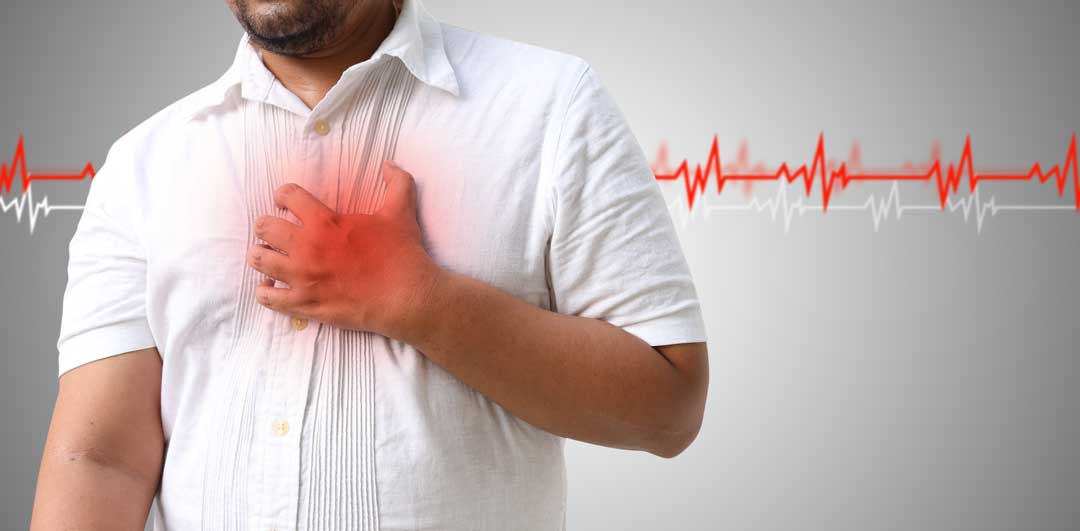
Cardiorespiratory Exercise reduces Hypertension?
dropcap]S[/dropcap]Cardio-respiratory exercise is any routine that raises heartbeat rate and increases oxygen movement. It engages your body parts and enhances the ability of your body to maintain a dynamic routine. Cardio focuses on the use of muscle groups. Cardiorespiratory activities can be moderate or high intensity. Some examples include running, bicycling, swimming, among others. These exercises ensure that energy and oxygen move to the muscles. Cardio-respiratory influences both the circulatory system and the respiratory system.

FACT: Almost 50% of people have high blood pressure and many are not aware
What is hypertesion?
High blood pressure, more commonly known as hypertension, is the amount of pressure that blood consistently overly exerts blood against vessel artery walls. Blood pressure rises as a result when the heart has to work harder.
The definition of hypertension is when the measure of blood pressure is above 140/90.
These numbers refer to systolic pressure readings measured in millimetres of mercury (mm Hg).
The first number is the blood pressure reading when the heart pumping the blood (systolic pressure), and lower number is the resting pressure of the heart (diastolic pressure).
Risk Factors
- Over weight / Obesity
- Lack of exercise
- Family/Work/Life Stresses
- Smoking
- Excess Alcohol
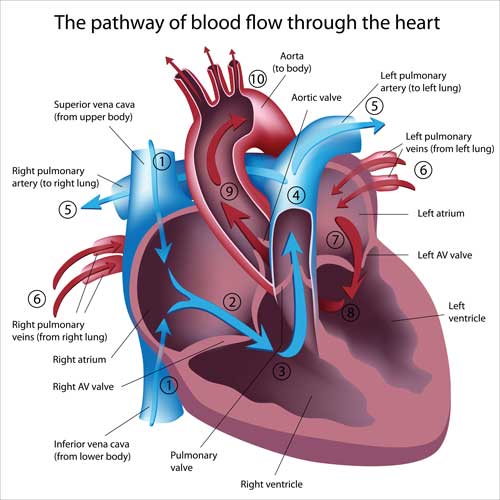
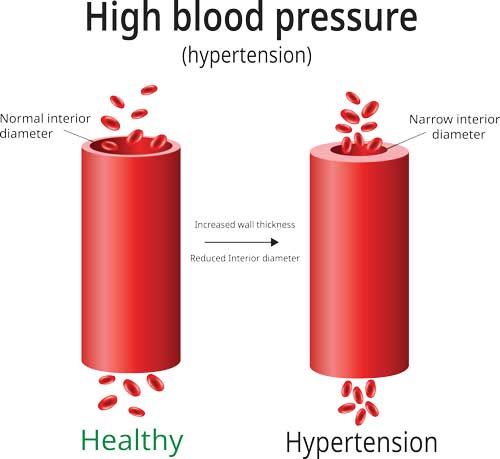
Blood Pressure Levels
There are typically 5-stages of hypertension.
- Normal: less than 120 / less than 80.
- Elevated Between 130 and 139/ less than 80
- Prehypertension Between 130 and 139/ between 80 and 89.
- Stage 1: Between 140 and 159 / 90 and 994.
- Stage 2 Higher 160 mm / 100 mm
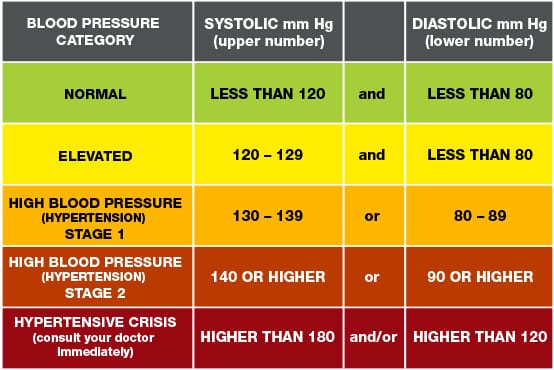
Source: https://www.heart.org/
Potential Health Impacts of Hypertension
- Stroke
- Heart attacks
- Heart Failure
- Aneurysm
- Atherosclerosis
- Kidney damage
- Loss of vision
- Mental issues
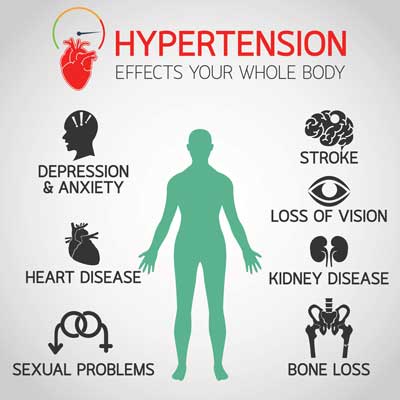
Effect of Regular Cardiorespiratory Exercise on Hypertension
Research shows that one in three adults are susceptible to hypertension. Hypertension is commonly referred to as a “silent killer.” The reason is that it often lacks symptoms. Yet, once it occurs, it can lead to life-threatening health issues, such as heart attack and stroke.
Within 24 hours after cardiorespiratory exercise, high blood pressure will reduce. Sometimes, the pressure level can even become less immediately after the aerobic fitness. This indicates that aerobic exercise plays a crucial role in lowered blood pressure.
The Silent Killer
- 1.3 Billion people suffer from hypertension
- 25% of men & 20% of women suffer from hypertension
- Less than 20% of per have it under control
- Major cause of premature death
Comon Symptoms of Hypertension
There are a range of symptons of hypertension some more serious than other. The symptons include:
- early morning headaches
- nose bleeds
- irregular heart rhythms
- vision changes
- buzzing in the ears
- fatigue
- nausea
- vomiting
- confusion
- anxiety
- chest pain
- muscle tremors
How Often Should You Perform Cardiorespiratory Exercise?
The United States of America Centres for Disease Control and Prevention recommends cardio for everyone. At least, adults should perform 150-180 minutes of moderate-intensity cardio weekly. Or, you may complete 75 minutes of rigorous cardio or combine the moderate-rigorous activity weekly. As for the teens, 60 minutes of moderate to high-intensity cardio is okay weekly.
Remember that you don’t have to perform the recommended minutes all at once. You can spend 10 minutes per day or spread the minutes across the week.
Benefits of Cardiorespiratory Exercise
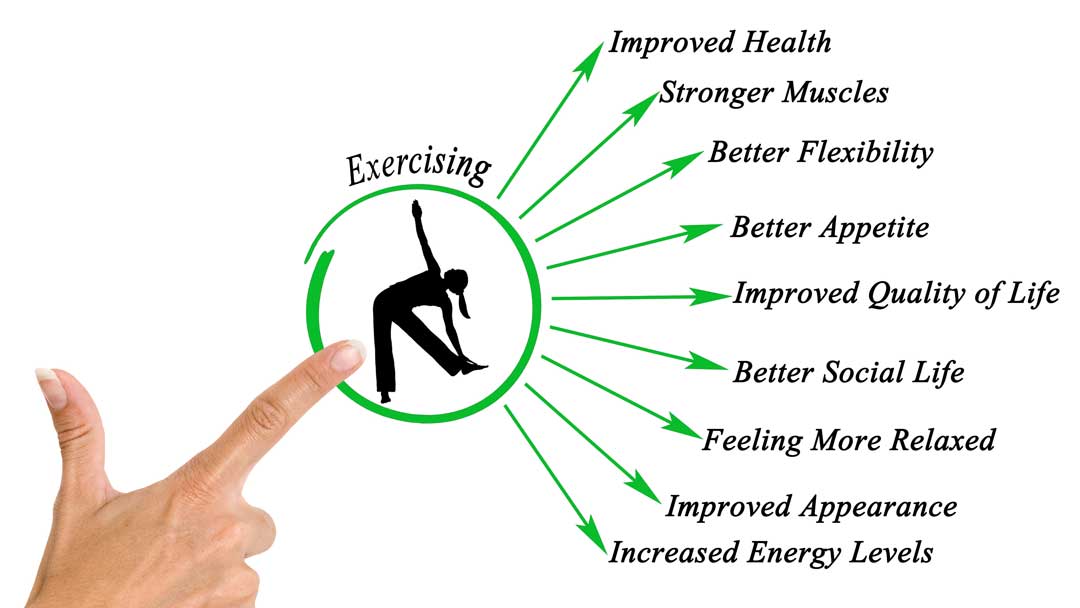
While some people often “look the other way” at the mention of cardio, it is a source of passion and pride for others. Whichever category, be informed that cardio is one of the most crucial fitness routines for any workout plan. For some fitness fam, it is a great way to shed off some pounds of excess fat. Also, it helps reduce calories due to several body movements involved. For some, it helps increase their endurance level for different activities. Read further to learn some crucial benefits of cardiorespiratory exercise.
Better Heart Wellness
As you would expect, cardio is a useful exercise to improve heart health. While working the body muscles, the cardiac muscles will also be engaged. As you work out the heart muscles, it will become stronger, just like other muscles in your body. Also, pumping the heart faster and regularly will improve the shape. More so, as the heart works more, other organs, such as lungs, will also work better. In this way, they will deliver oxygen-rich blood across the body. If you do not work out your cardiac muscles for a long time, it will become weak. And it may result in severe health conditions.
Enhanced Recovery Ability
Low and moderate-intensity cardio fitness reduces your recovery time after the routine. For instance, let’s assume that you have been handling resistance training for about one hour. Waste products will accumulate in your body during the resistance training. You can get rid of them by performing a light jog after the routine. Cardio exercise reduces muscle soreness. Also, it helps send oxygen-rich blood to the muscles. So, it facilitates muscle repair and recovery process.
Improved Metabolism
Fitness trainers and diet experts often recommend cardio exercise. This is because it helps improve body metabolism. Also, cardio fitness increases the rate of other body functions. As you increase your cardio session, you will notice a significant rise in your metabolic rate. Also, when you raise your body metabolism, it will help maintain the ideal body weight.
Recommendable Cardiorespiratory Endurance Routines to Perform
vidently, cardio is a reliable routine for enhancing the delivery of abundant oxygen and energy to the body tissues. Also, you should perform aerobic endurance to eliminate body wastes quickly. More so, they are effective routines for weight maintenance and minimization of heart disease risk. To enjoy these benefits, endeavour to add a few of the following cardio exercises to your workout schedule.
1. Walking
Only a few other aerobic exercises beat the simplicity and convenience of walking as a cardio routine. You can perform this routine either outside or inside your home. By performing regular walking, you can reduce the risk of severe health conditions, such as type II diabetes, among other diseases. But try to pair walking with another cardio exercise in your routine plan. Also, while walking, ensure that you keep a moderate pace and take along enough water.

2. Swimming
Swimming is a popular sport and exercise. More importantly, it is useful for improving health function and lung performance. Swimming helps stretch body muscles and increase blood flow. Lastly, it enhances the entire body function.

3. Cycling
Many appreciate cycling because it is environmentally friendly. As for fitness fam, it is an effective booster of cardiorespiratory fitness. Also, it is an ideal method for working body muscles at low risk.

4. Running
Here is a common cardio exercise among fitness fam. Although some often begin with a few rounds of jogging, you can start high-intensity cardio with a burst of a run. In this way, the heart rate will increase, and blood circulation will also improve.

Other Cardiorespiratory Activities to Consider
Some sports and games are ideal cardio exercises as they help engage the heart and lungs. Many sports work out the body muscles, including cardiac muscles, as much as the primary cardio exercise would do. Consider the following sport and games while performing cardio routine – it can be fun and physically rewarding at the same time.
- Sports: Competitive events are excellent cardio routines. Such activities include
football, basketball, kickball, soccer, and tennis. As you run around the ball or try to hit your target, you will be pumping the heart at a faster rate. Also, it helps engage other body muscles. You may also consider sports such as cross-country skiing, sledding, ice skating, and snowshoeing. If you want high-intensity cardio sports, then consider martial arts. - Games: Several games are available that don’t only engage the brain but also demand physical effort. For instance, you need to move those muscles and get the heart pumping to play classic backyard games with the kids.
- Dancing: With your favourite music and some nice dance steps, you can work out your heart muscles while enjoying a nice time. In this case, you need to perform and focus on movements more than coordination. Also, you can perform dancing video games to have an exciting cardio fitness time.
- Skipping and Hopping: Use the jump ropes to perform several sessions of skipping and get the cardiac muscles working at a faster rate. Also, you can use the hula hoops to play some hopping with your mates and get your cardiac workout done excitingly.
Conclusion
Now, we believe that if you are ever asked the question, how might regular cardiorespiratory exercise affect hypertension? You can provide an answer and more. Nutritionists recommend cardiorespiratory endurance exercise for reducing calories. Also, it is ideal for maintaining a healthy body weight. Thus, you don’t just get to improve your fitness level, but also have an enhanced metabolism.
Before we conclude, endeavour to add cardio exercise to your workout plan. Otherwise, you will only be developing body muscles without improving your heart muscle.
In this case, you may experience severe health conditions despite performing health routines. So, cardio is crucial to a well-functioning body.
You can also try some of the exciting aerobic routines explained herein with your kids and spouse.
Eventually, it will help improve your heart and lung health, as well as your emotional state.
Other Articles you may like.
Register Now
Get the gym tip of the day and a step by step men’s fitness guide delivered right in your inbox!
